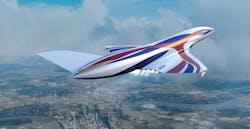Reaction Engines testing ammonia as carbon-free aviation fuel
ABINGDON, UK - Reaction Engines and Britain's Science and Technology Facilities Council (STFC) have completed a concept study into the practicality of using ammonia as a jet aviation fuel. By teaming Reaction Engines's heat exchanger technology with STFC's advanced catalysts, they hope to produce a sustainable, low-emission propulsion system for tomorrow's aircraft, David Szondy reports for New Atlas. Continue reading original article.
The Intelligent Aerospace take:
August 25, 2020 - Ammonia as a air travel fuel source isn't new - the landmark X-15 rocket plane utilized anhydrous ammonia fuel and liquid oxygen oxidizer to take pilots to the edge of space and speeds above 4,000 MPH. Ammonia is, however, much more environmentally friendly than traditional fossil fuels.
Ammonia fuel, like regular avgas, would be stored in the wings. Then, the gas would be pumped from the tank through a heat exchanger to warm it up. The ammonia would be split into hydrogen and nitrogen via a catalyst in a "cracking reactor." Now a burnable fuel mixture, the fuel mix is fed into the jet combustion chamber to create thrust, which would then emit nitrogen and water vapor.
"The combination of Reaction Engines’ transformative heat exchanger technology and the STFC’s innovative catalysts will enable development of a game-changing class of green ammonia-based aviation propulsion systems," says Dr. James Barth, engineering lead at Reaction Engines. "Our study showed that an ammonia-fueled jet engine could be adapted from currently available engines, and ammonia as a fuel doesn’t require a complete re-think of the design of civil aircraft as we know them today. This means a fast transition to a sustainable aviation future is possible at low cost; ammonia-powered aircraft could be serving the world’s short-haul routes well in advance of 2050."
Related: Hypersonic flight technology just passed a 'hugely significant' milestone
Related: Reaction Engines test validates precooler at hypersonic conditions
Jamie Whitney, Associate Editor
Intelligent Aerospace
